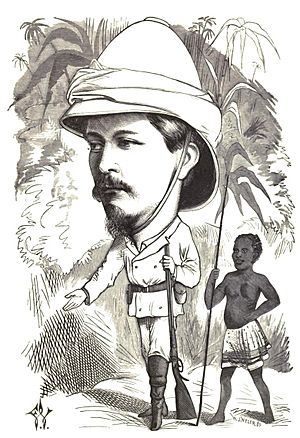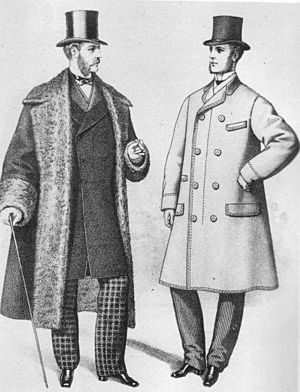Victorian masculinity facts for kids
During the Victorian era (a time when Queen Victoria ruled Britain), people had certain ideas about how men and women should act. These ideas were called "social expectations." In the United Kingdom and the British Empire, there were specific expectations for men. Studying Victorian masculinity means looking at how men's ideas about themselves changed over time.
What it meant to be a man in Victorian times was very complex. Many things influenced it, like family life, the economy, gender roles (how men and women were expected to behave), imperialism (when a country extends its power), good manners, religion, and sports. Victorian men often felt great pride in their work. They also felt it was their job to protect their wives and show good social behaviour. These ideas are still interesting to people who study culture and gender studies today. They also help us understand history and sociology.
Contents
How Victorian Manhood Began
Studying Victorian manhood helps us understand that ideas about being a man are not always the same. They change depending on the time in history. During the Victorian era, men started forming secret groups like the Masons and the Oddfellows. Victorians believed that "manliness" was a good thing. It meant having control and being civilized, unlike "maleness," which they saw as more wild or brutish.
Religion and Family Leadership
Christianity played a big part in shaping Victorian ideas of masculinity. A "real" Victorian man was expected to be spiritual and a faithful believer. The husband and father was seen as the pater familias, which means the "father of the family." He had a lot of power in the home. As the head of the household, his duty was to lead his wife and children and also to protect them.
Work and Public Life

Victorian men were very active in public life, unlike women who mostly stayed in the private sphere (at home). Working was very important for a man to be seen as truly masculine. This was especially true for middle-class men. Men from the aristocracy (rich, noble families) were sometimes seen as lazy because they often did not work. By working and running businesses, men fulfilled their duty as "breadwinners." This meant they earned money to support their families.
Home and work were seen as very separate places. So, working from home was tricky. For example, writers who worked at home sometimes worried it might make them seem less masculine. Besides work, Victorian men also spent time in public places like clubs and taverns. Here, they enjoyed spending time mostly with other men.
Even sports changed. At first, "fair play" was the most important part of a game. But later, people started to focus on studying sports "scientifically" to win and make money.
Muscular Christianity: Strong Bodies, Strong Minds
In the second half of the 1800s, the idea of the ideal man started to change. New ideas from books like Charles Darwin's The Origin of Species (1859) and Friedrich Nietzsche's ideas about religion made people think differently. The main focus for men shifted from just being spiritual to also being physically strong. This new idea was called 'muscular Christianity'. At the same time, men spent less time focused on home life.
Sports and Being Ready for Action
This new focus on muscles meant people believed that to have a good mind, you also needed a strong body. This idea came from the rise of natural science, especially biology. People became very interested in health. This led to a huge interest in sports and games. Boys, especially, played sports through the public school system. The athlete became a new kind of hero in society.
This focus on physical training had another reason. By the late 1800s, people felt the British Empire was in danger. Athletic boys from public schools made good recruits for the army.
Imperialism and Adventure
In the later 1800s, the ideal Victorian man was also defined by imperialism. This was a time when Britain was very powerful and took control of many non-Western cultures. So, being a man also meant having military and patriotic virtue. The ideal man was seen as brave and tough, like hunters, adventurers, and pioneers. These men were very self-sufficient and independent. They also had a lot of scientific knowledge. This focus on toughness and endurance even changed how men dressed. Bright colors and fancy materials were out. Dark colors, straight cuts, and stiff materials were in.
See also
- Masculinity
- Christian manliness
 | Bessie Coleman |
 | Spann Watson |
 | Jill E. Brown |
 | Sherman W. White |


